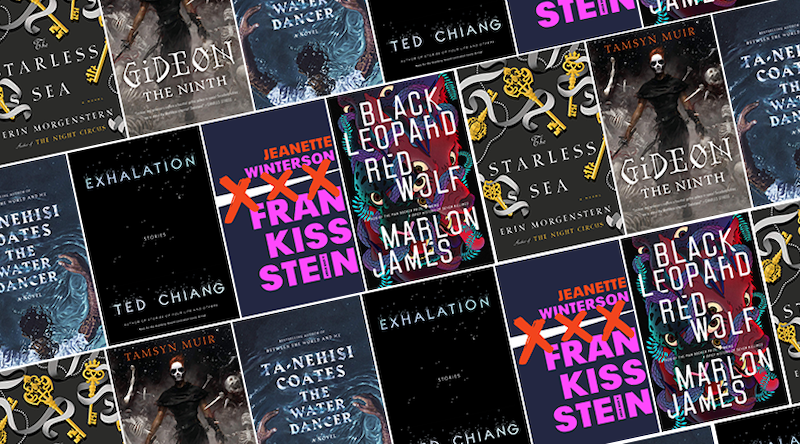
We’ve come to the end of another year in reading, folks, and as stewards of this venerable repository of literary criticism, it is once again our sacred duty to dust off the abacuses (abaci?) and tabulate the best reviewed books of past twelve months.
Yes, using reviews drawn from more than 150 publications, over the next two weeks we’ll be revealing the most critically-acclaimed books of 2019, in the categories of (deep breath): Memoir & Biography, Poetry, Sci-Fi & Fantasy, Essay Collections, Short Story Collections, Graphic Literature, Literature in Translation, Mystery & Crime, General Fiction, and General Nonfiction.
Today’s installment: Sci-Fi and Fantasy.
1. Black Leopard Red Wolf by Marlon James
20 Rave • 19 Positive • 3 Mixed • 1 Pan
“In these pages, James conjures the literary equivalent of a Marvel Comics universe—filled with dizzying, magpie references to old movies and recent TV, ancient myths and classic comic books, and fused into something new and startling by his gifts for language and sheer inventiveness … James is such a nimble and fluent writer … Even when he is nestling one tale within another like Russian dolls that underscore the provisional nature of storytelling… he is giving us a gripping, action-packed narrative. What the novel could have used is a little judicious pruning: As in superhero movies, the action sometimes assumes a predictable, episodic rhythm—one violent, bravura showdown after another, strung together by interludes of travel and efforts to regroup and connect the dots … With Tracker and the Leopard, James has created two compelling and iconic characters—characters who will take their place in the pantheon of memorable and fantastical superheroes.”
–Michiko Kakutani (The New York Times)
2. Exhalation by Ted Chiang
22 Rave • 7 Positive
“A handful of living science fiction writers have attained godlike status—N.K. Jemisin, Cixin Liu, and Ann Leckie, to name a few. But Ted Chiang is the only one who’s done it without writing a novel … oh, his stories. They’re a religious experience … In Exhalation, which could be subtitled ‘Black Mirror For Optimists,’ every story seems crafted with one objective in mind—pure awe … The three longer stories in Exhalation are Chiang’s finest work to date … Savor all nine of these stories. Read them one sitting at a time, somewhere still and quiet, and let them sink in.”
–Adam Morgan (The AV Club)
3. The Water Dancer by Ta-Nehisi Coates
13 Rave • 20 Positive • 2 Mixed • 2 Pan
“….his debut novel comes with slightly unrealistic expectations—and then proceeds to exceed them. The Water Dancer, Coates’ meditation on the legacy of slavery, is a work of both staggering imagination and rich historical significance … Coates re-creates the world of the pre-Civil War South—from the plantations’ cramped slave quarters and ornate parlors to abolitionist gatherings to the jails run by Southern militias—with a journalist’s eye and ear for detail … What’s most powerful is the way Coates enlists his notions of the fantastic, as well as his fluid prose, to probe a wound that never seems to heal … Timeless and instantly canon-worthy.”
–David Fear (Rolling Stone)
4. Frankissstein by Jeanette Winterson
11 Rave • 13 Positive • 5 Mixed • 1 Pan
“Frankissstein is a fragmented, at times dazzlingly intelligent meditation on the responsibilities of creation, the possibilities of artificial intelligence and the implications of both transsexuality and transhumanism … As is to be expected from a novel both constructed from and beholden to the nebulous realm of ideas, there are moments when the book’s speculative nature threatens to overwhelm its sense of tangible reality … As a result, readers may occasionally begin to feel rather disembodied themselves, immersed in the deoxygenated atmosphere of pure thought. Winterson’s great gift as a writer, though, is the ability to inject pure thought with such freewheeling enthusiasm and energy that ideas take on their own kind of joyous life. Frankissstein abounds with invention … Such is Winterson’s comfort across modes and forms, she’s also able to leaven the hyperinvention of rogue science with deeply evocative historical realism balanced by hilarious, almost bawdy set pieces … this is a work of both pleasure and profundity, robustly and skilfully structured, and suffused with all Winterson’s usual preoccupations – gender, language, sexuality, the limits of individual liberty and the life of ideas.”
–Sam Byers (The Guardian)
5. Gideon the Ninth by Tamsyn Muir
13 Rave • 2 Positive • 1 Mixed
“… a freaky science-fantasy-horror-romance mash-up that owes its innards to M.A.S.H. and Harry Potter in equal measure; to a thousand Agatha Christie locked-house mysteries and Sweet Valley High. The set-up is genius … Muir uses the claustrophobia and narrowed focus to fine purpose … too funny to be horror, too gooey to be science fiction, has too many spaceships and autodoors to be fantasy, and has far more bloody dismemberings than your average parlor romance. It is altogether its own thing—brilliantly original, messy and weird straight through. With a snorting laugh and two middle fingers, the whole thing burns end-to-end. It is deep when you expect shallow, raucous when you expect dignity and, in the end, absolutely heartbreaking when you least expect it.”
–Jason Sheehan (NPR)
6. The Starless Sea by Erin Morgenstern
11 Rave • 6 Positive • 4 Mixed • 1 Pan
“… extravagantly imaginative … Morgenstern’s major plot is the stuff of a bibliophile’s dreams, but she layers the narrative with snippets of fables and fairy tales, pieces in a meta-puzzle box that you may never figure out. Authorial flourishes and literary Easter eggs abound, allusions to illusions. There are nods to Tolkien and Sendak, Susanna Clarke and Lev Grossman, Grimm and Gaiman. The intricate world-building is nothing short of fabulous, the prose lush and filigreed. Still, it’s probably no accident that Patience and Fortitude, the lions at the entrance of the New York Public Library, make a cameo in the 500-page tale. Morgenstern knows every whichaway around story and myth, but you may well get lost in The Starless Sea. Bon voyage!”
–Nancy Pate (The Star Tribune)
7. The City in the Middle of the Night by Charlie Jane Anders
7 Rave • 12 Positive • 1 Mixed
“Much of the pleasure of The City in the Middle of the Nightcomes from its slyly understated novelty … The characters’ raw, painful honesty and their troubled relationships to each other form the heart of the novel. These relationships reach, with realistically varying success, across a range of barriers—not only of social class, but also of national identity and, indeed, of species. These finely drawn intimacies concretize the much larger social and environmental issues with which Anders’s ambitious novel grapples … Here, Anthropocene allegories emerge without eclipsing organic characterization or plot. The development of the Gelet plot line is handled slightly more clumsily, but still with a depth of imaginative world-building that keeps the novel compelling … This plot line seems at times a bit too conveniently scaled to the world of the characters, a bit too neatly explained, but the vividness with which the characters are drawn…keeps the narrative taut, driven by well-grounded emotional conflict rather than ham-handed moralizing. The City in the Middle of the Night is both an urgent exploration of the political exigencies of the Anthropocene and a sprawling epic that refuses simple reduction to climate extrapolation.”
–Rebecca Evans (The Los Angeles Review of Books)
8. The Warehouse by Rob Hart
9 Rave • 7 Positive • 3 Mixed
“.. an entertaining read as a slightly dystopian cyberthriller. But start looking at how plausible it is, notice all the ways in which the things Hart describes—awful healthcare, limited employment opportunities, and global monopolies—are already here, and it becomes a horrific cautionary tale that makes you wonder if we’re already too far into a disastrous future, or if there’s still some hope for humanity … Gibson, who resembles Donald Trump in many ways, is just one of many elements that make The Warehouse an outstanding read. Then there’s Hart’s attention to detail … Hart’s love for crime fiction is ever-present, but The Warehouse has a level of social critique that goes above and beyond his previous work to take on all of corporate America … a fun, fast-paced read full of well-developed characters and a plot that builds to an explosive finale. It treads known dystopian ground, but the story’s so close to our reality that it walks a fine line between a near-future thriller and a smart satire. Comparisons to Amazon are easy to make, and that’s precisely what should worry us the most. It’s also where things get meta because that’s where most readers will buy the book. Nicely played, Mr. Hart.”
–Gabino Iglesias (NPR)
9. The Bird King by G. Willow Wilson
9 Rave • 3 Positive • 1 Mixed
“In no way does this setting render the novel less intriguing and accessible, though, even to younger readers … Wilson’s engaging characters quickly earn our sympathy … Wilson never skimps on the action to meditate on the novel’s religious themes, but the contrasts of worldviews, between Muslim and Christian, between monastic faith and Inquisitorial thuggishness, between legend and history, between different kinds of belief, are never far from the surface … The notion of viewing the same mysterious island from the dual perspectives of Christian and Islamic legend is perhaps Wilson’s neatest thematic trick in the novel … Wilson brings off an impressive narrative high-wire act that neatly balances the contrasting world views with a few conventions of literary fantasy … will easily satisfy most readers with its fabulous adventures and intriguing characters—I wouldn’t mind meeting Vikram again sometime—it’s also a deeply thoughtful novel about how the world is what our perspectives make it.”
–Gary K. Wolfe (Locus)
10. Ninth House by Leigh Bardugo
9 Rave • 3 Positive
“… wry, uncanny, original and, above all, an engrossing, unnerving thriller … The world that Alex navigates feels intimately lived-in. A Yale alum, Bardugo name-checks New Haven’s buildings, streets, restaurants and stores. Except for Lethe, all the secret societies featured in the novel actually exist. These elements create a fluid feeling of not knowing precisely where reality leaves off and fantasy takes over, creating layers of mystery for the reader … Alex is a potent mix of flinty strength and raw vulnerability and a brilliant instrument to channel the novel’s tone, which is simultaneously elegant and grotesque, eerie and earthbound … Alex stands at the crossroads of privilege and pragmatism, and her unique point of view opens the most relatable and often the funniest windows into the story’s themes … Investigative momentum propels Alex through some convincing misdirection before she comes to a climactic confrontation that resonates emotionally. Alex gets answers, but they lead her only to new questions, leaving readers hungry as a hellbeast for the sequel that is sure to follow.”
–Ellen Morton (The Washington Post)
*
Our System: RAVE = 5 points • POSITIVE = 3 points • MIXED = 1 point • PAN = -5 points
 Image by Gerd Altmann from Pixabay[/caption]
Image by Gerd Altmann from Pixabay[/caption]

